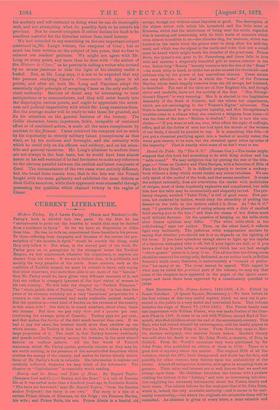CURRENT LITERATURE.
Modern Turkey. By J. Lewis Farley. (Hurst and Blackett.)—Mr. Farley's book is divided into two parts. In the first he has "endeavoured to point out the benefits to health that may be derived from a residence in Syria." So far we have no disposition to differ from him. He has, he tells us, experienced these benefits in his person. To those suffering from dyspepsia and diseases of the nerves the pre- scription of "six months in Syria" would be exactly the thing, could they only follow it. But when, in the second part of his book, Mr. Farley goes on to panegyrise in the strongest terms the Turkish Empire, we feel constrained, whatever his experience, to express our dissent from his views. If we are to believe him, it is politically and socially the very paradise of the earth. Some matters, such as the condition of Turkish women, we must be content to leave, only saying that other observers, who have been able to see more of the " hareem " than Mr. Farley could do, have given very different accounts of it, and that our author is strangely ignorant of the legal status of women in his own country. We will take the chapter on "Turkish Finances.' The "whole public debt of Turkey," says Mr. Farley, "is less than five years of its revenue, certainly not a very 'hazardous' proportion for a country so rich in ascertained and easily realisable natural wealth." But the question is—what kind of burden on the revenue of the country is this same debt ? Our debt is, in round numbers, about eleven times Our income. But then we pay only three and a quarter per cent. (reckoning the average price of Consols). Turkey pays ten per cent., and that makes the burden of the debt much heavier than ours. If we had to pay the same, the interest would more than swallow up our whole income. In Turkey it does not do that, but it takes a fearfully large proportion of it. The truth is, that Turkey borrows recklessly and spends recklessly, wasting money, for instance, in the most absurd fashion on endless palaces. All the fine words of Turkish statesmen which Mr. Farley quotes, perfectly sincere as they may be, are worth nothing, in the presence of the uncontrolled despotism which crashes the energy of the country, and makes its future utterly unsafe. Some of Mr. Parley's book is valuable. His information is copious and carefully collected, whatever we may think of his inferences. The chapter on "Capitulations" is especially worth reading.


































 Previous page
Previous page